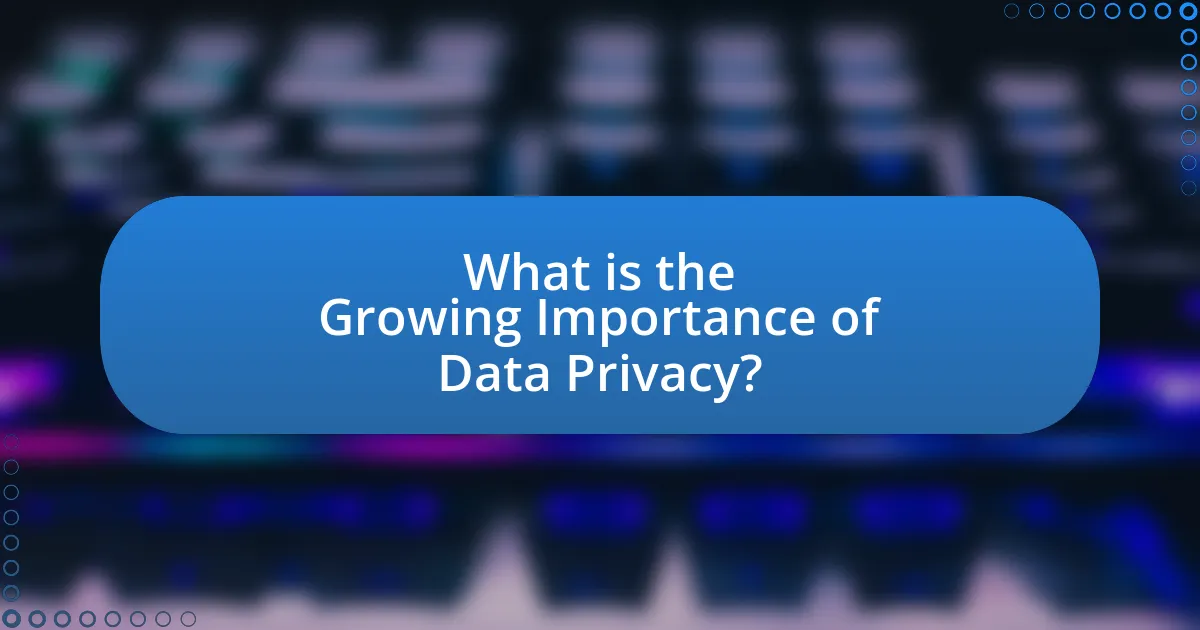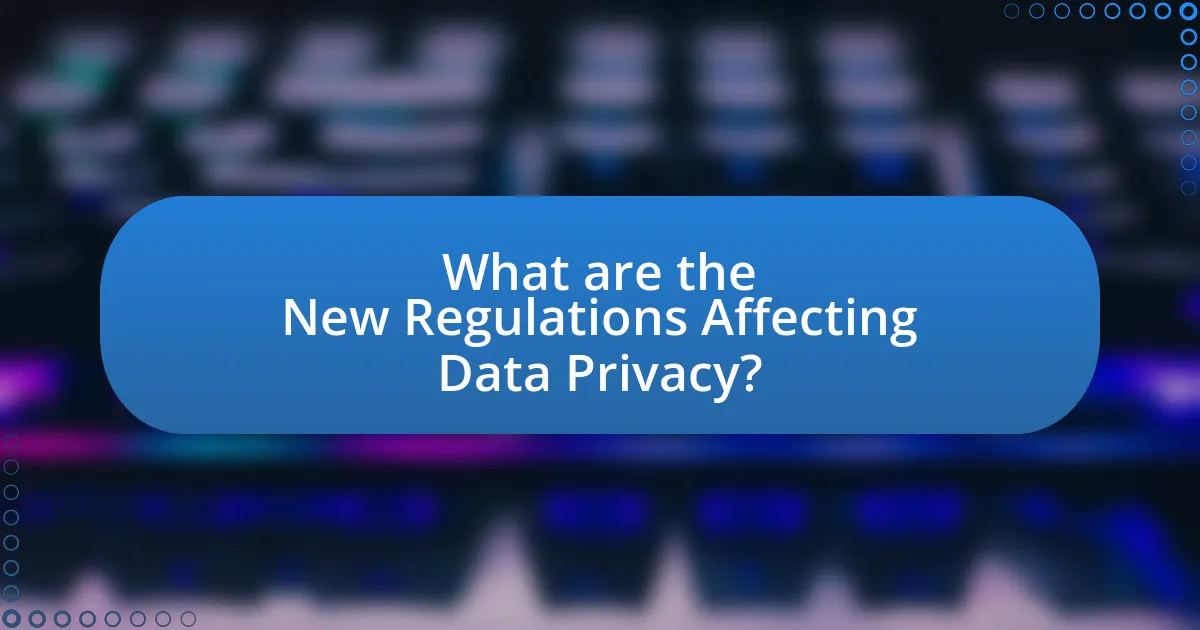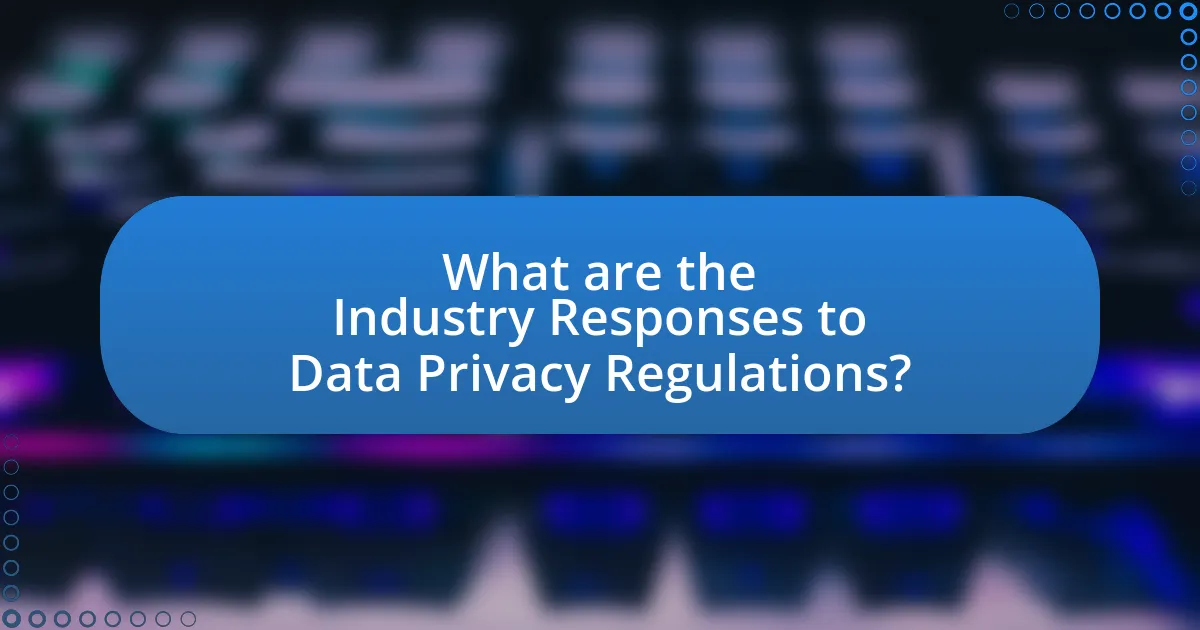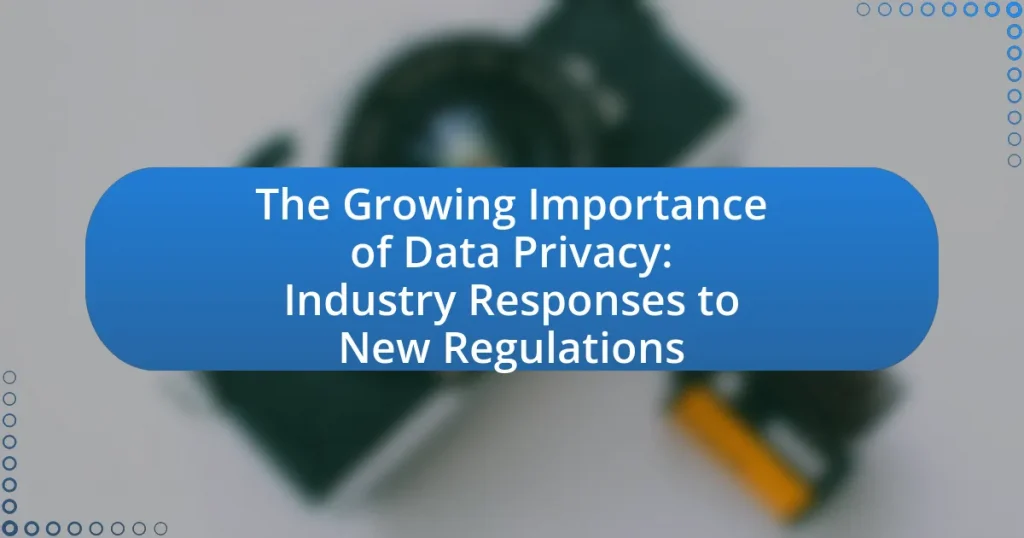The article focuses on the growing importance of data privacy in response to increasing regulatory requirements and consumer demand for the protection of personal information. It highlights the impact of regulations such as the General Data Protection Regulation (GDPR) and the California Consumer Privacy Act (CCPA) on organizational practices, emphasizing the need for compliance to avoid penalties and reputational damage. Key factors driving the demand for data privacy include heightened consumer awareness, the frequency of data breaches, and the influence of consumer expectations on corporate data handling practices. The article also discusses industry responses to these regulations, including the adoption of advanced technologies and best practices for effective data privacy management.

What is the Growing Importance of Data Privacy?
The growing importance of data privacy stems from increasing regulatory requirements and consumer demand for protection of personal information. As organizations collect vast amounts of data, incidents of data breaches and misuse have heightened public awareness and concern. For instance, the implementation of regulations like the General Data Protection Regulation (GDPR) in Europe has set stringent standards for data handling, compelling businesses to prioritize data privacy to avoid hefty fines and reputational damage. Additionally, surveys indicate that over 80% of consumers are more likely to engage with companies that demonstrate a commitment to data privacy, highlighting its critical role in maintaining customer trust and loyalty.
Why is data privacy becoming a critical issue in today’s digital landscape?
Data privacy is becoming a critical issue in today’s digital landscape due to the increasing frequency of data breaches and the growing awareness of individuals regarding their personal information. In 2021 alone, data breaches exposed over 22 billion records globally, highlighting vulnerabilities in data security. Additionally, regulations such as the General Data Protection Regulation (GDPR) and the California Consumer Privacy Act (CCPA) have raised the stakes for organizations, mandating stricter compliance measures and increasing penalties for non-compliance. This regulatory environment, combined with consumer demand for transparency and control over personal data, underscores the urgency of addressing data privacy concerns.
What are the key factors driving the demand for data privacy?
The key factors driving the demand for data privacy include increasing consumer awareness, regulatory compliance, and the rise in data breaches. Consumers are more informed about their rights and the risks associated with data misuse, leading to heightened expectations for privacy protection. Regulatory frameworks, such as the General Data Protection Regulation (GDPR) in Europe, impose strict requirements on organizations to safeguard personal data, compelling businesses to prioritize data privacy. Additionally, the frequency of high-profile data breaches has heightened concerns about security, prompting both individuals and organizations to seek stronger privacy measures. These factors collectively underscore the critical need for robust data privacy practices in today’s digital landscape.
How do consumer expectations influence data privacy practices?
Consumer expectations significantly influence data privacy practices by driving companies to adopt more stringent privacy measures. As consumers increasingly demand transparency and control over their personal data, businesses respond by implementing robust privacy policies and practices to meet these expectations. For instance, a 2021 survey by the International Association of Privacy Professionals found that 79% of consumers are concerned about how their data is used, prompting organizations to enhance their data protection strategies to maintain customer trust and comply with regulations like the GDPR. This alignment between consumer expectations and corporate practices illustrates the direct impact of public sentiment on data privacy standards.
What are the implications of data privacy for businesses?
Data privacy has significant implications for businesses, primarily affecting their compliance, reputation, and operational costs. Businesses must adhere to regulations such as the General Data Protection Regulation (GDPR), which imposes strict guidelines on data handling and can result in hefty fines for non-compliance, with penalties reaching up to 4% of annual global turnover. Additionally, failure to protect customer data can lead to reputational damage, as consumers increasingly prioritize privacy and may choose to disengage from brands that do not safeguard their information. Furthermore, implementing robust data privacy measures often requires substantial investment in technology and training, impacting overall operational costs. These factors collectively underscore the critical importance of data privacy in shaping business strategies and practices.
How can data privacy impact customer trust and loyalty?
Data privacy significantly impacts customer trust and loyalty by influencing how consumers perceive a brand’s commitment to safeguarding their personal information. When companies implement robust data privacy measures, customers are more likely to trust them, leading to increased loyalty. According to a 2021 survey by Cisco, 86% of consumers are concerned about data privacy, and 49% would stop engaging with a brand after a data breach. This demonstrates that effective data privacy practices not only enhance trust but also foster long-term customer relationships, as consumers prefer to engage with brands that prioritize their privacy and security.
What are the potential risks of neglecting data privacy?
Neglecting data privacy poses significant risks, including data breaches, identity theft, and legal penalties. Data breaches can lead to unauthorized access to sensitive information, resulting in financial loss and reputational damage for organizations. Identity theft can occur when personal data is mishandled, affecting individuals’ financial security and personal safety. Furthermore, non-compliance with data protection regulations, such as the General Data Protection Regulation (GDPR), can result in hefty fines, with penalties reaching up to 4% of annual global turnover or €20 million, whichever is higher. These risks underscore the critical need for robust data privacy measures in today’s digital landscape.

What are the New Regulations Affecting Data Privacy?
New regulations affecting data privacy include the General Data Protection Regulation (GDPR) in Europe, the California Consumer Privacy Act (CCPA) in the United States, and various state-level privacy laws. GDPR, implemented in May 2018, mandates strict guidelines for data collection and processing, granting individuals greater control over their personal data. The CCPA, effective January 2020, enhances privacy rights for California residents, allowing them to know what personal data is collected and to whom it is sold. Additionally, states like Virginia and Colorado have enacted their own privacy laws, reflecting a growing trend towards more stringent data protection measures across the U.S. These regulations aim to enhance consumer trust and accountability among businesses handling personal information.
What are the major data privacy regulations currently in place?
The major data privacy regulations currently in place include the General Data Protection Regulation (GDPR) in the European Union, the California Consumer Privacy Act (CCPA) in the United States, and the Personal Information Protection and Electronic Documents Act (PIPEDA) in Canada. GDPR, enacted in 2018, sets stringent guidelines for data collection and processing, granting individuals greater control over their personal data. CCPA, effective from January 2020, enhances privacy rights for California residents, allowing them to know what personal data is collected and to whom it is sold. PIPEDA, established in 2000, governs how private sector organizations collect, use, and disclose personal information in the course of commercial activities. These regulations reflect a global trend towards stronger data privacy protections.
How do regulations like GDPR and CCPA shape data privacy standards?
Regulations like GDPR and CCPA establish stringent data privacy standards by mandating organizations to implement robust data protection measures and granting individuals greater control over their personal information. GDPR, enacted in the European Union in 2018, requires businesses to obtain explicit consent from users before processing their data, while CCPA, effective in California in 2020, allows consumers to know what personal data is collected and to opt out of its sale. These regulations have led to a global shift in data privacy practices, compelling companies to adopt transparency, accountability, and enhanced security protocols to comply with legal requirements, thereby raising the overall standard of data privacy across industries.
What are the penalties for non-compliance with these regulations?
Penalties for non-compliance with data privacy regulations can include substantial fines, legal action, and reputational damage. For instance, under the General Data Protection Regulation (GDPR), organizations can face fines up to €20 million or 4% of their global annual revenue, whichever is higher, for serious violations. Additionally, non-compliance may lead to lawsuits from affected individuals or regulatory bodies, further exacerbating financial and reputational harm. These penalties underscore the critical need for organizations to adhere to data privacy regulations to avoid significant consequences.
How are businesses adapting to these new regulations?
Businesses are adapting to new data privacy regulations by implementing comprehensive compliance strategies and enhancing data protection measures. Many organizations are investing in updated technology solutions, such as encryption and secure data storage, to safeguard customer information. For instance, a survey by the International Association of Privacy Professionals found that 70% of companies have increased their budget for data privacy initiatives in response to regulations like the GDPR and CCPA. Additionally, businesses are conducting regular audits and training employees on data handling practices to ensure adherence to legal requirements. This proactive approach not only mitigates risks but also builds consumer trust in an increasingly privacy-conscious market.
What strategies are companies implementing to ensure compliance?
Companies are implementing several strategies to ensure compliance with data privacy regulations. These strategies include establishing comprehensive data governance frameworks, conducting regular audits, and providing employee training on data protection practices. For instance, a survey by PwC found that 79% of organizations have implemented data governance frameworks to manage compliance effectively. Additionally, companies are leveraging technology solutions such as data encryption and access controls to safeguard sensitive information, which aligns with the requirements set forth by regulations like GDPR and CCPA. Regular audits help identify compliance gaps, while employee training ensures that staff are aware of their responsibilities regarding data privacy.
How do organizations assess their current data privacy practices?
Organizations assess their current data privacy practices through comprehensive audits and risk assessments. These evaluations typically involve reviewing data handling processes, compliance with relevant regulations such as GDPR or CCPA, and identifying potential vulnerabilities in data protection measures. For instance, a 2021 survey by the International Association of Privacy Professionals found that 70% of organizations conduct regular privacy assessments to ensure adherence to evolving legal standards. This systematic approach enables organizations to identify gaps in their privacy practices and implement necessary improvements to safeguard personal data effectively.

What are the Industry Responses to Data Privacy Regulations?
Industries are responding to data privacy regulations by implementing comprehensive compliance strategies, enhancing data protection measures, and investing in privacy-focused technologies. For instance, companies like Microsoft and Apple have adopted privacy-by-design principles, integrating data protection into their product development processes. Additionally, many organizations are appointing Chief Privacy Officers to oversee compliance and ensure adherence to regulations such as the General Data Protection Regulation (GDPR) and the California Consumer Privacy Act (CCPA). According to a report by the International Association of Privacy Professionals (IAPP), 70% of organizations have increased their privacy budgets in response to these regulations, highlighting the growing emphasis on data privacy across various sectors.
How are different industries responding to the growing importance of data privacy?
Different industries are implementing stricter data privacy measures in response to the growing importance of data privacy. For instance, the healthcare sector is adopting enhanced encryption protocols and patient consent management systems to comply with regulations like HIPAA, ensuring that patient data is securely handled. The financial industry is investing in advanced cybersecurity technologies and conducting regular audits to protect sensitive customer information, driven by regulations such as GDPR and CCPA. Additionally, the technology sector is increasingly prioritizing transparency in data collection practices and offering users more control over their personal information, reflecting a shift towards user-centric privacy policies. These actions are supported by a 2022 survey from the International Association of Privacy Professionals, which found that 70% of organizations are increasing their investment in data privacy initiatives.
What specific measures are being taken in the tech industry?
The tech industry is implementing specific measures such as enhancing data encryption, adopting privacy-by-design principles, and increasing transparency in data handling practices. Companies are investing in advanced encryption technologies to protect user data from unauthorized access, which is crucial given the rise in data breaches. Additionally, many organizations are integrating privacy-by-design into their product development processes, ensuring that data protection is considered from the outset. Furthermore, tech firms are committing to clearer privacy policies and user consent mechanisms, aligning with regulations like the General Data Protection Regulation (GDPR) and the California Consumer Privacy Act (CCPA), which mandate greater transparency and user control over personal data. These measures reflect the industry’s proactive approach to comply with evolving data privacy regulations and to build consumer trust.
How are financial institutions addressing data privacy concerns?
Financial institutions are addressing data privacy concerns by implementing robust data protection measures and adhering to regulatory frameworks. These institutions are investing in advanced encryption technologies, conducting regular security audits, and enhancing employee training on data privacy protocols. For instance, according to a 2022 report by the Financial Stability Board, 85% of financial institutions have adopted stricter data governance policies in response to increasing regulatory scrutiny. Additionally, many institutions are leveraging privacy-enhancing technologies, such as anonymization and pseudonymization, to safeguard customer information while complying with regulations like the General Data Protection Regulation (GDPR) and the California Consumer Privacy Act (CCPA).
What role does technology play in enhancing data privacy?
Technology plays a crucial role in enhancing data privacy by providing tools and solutions that protect personal information from unauthorized access and breaches. Encryption technologies, for instance, secure data by converting it into a format that can only be read by authorized users, significantly reducing the risk of data theft. According to a report by the International Association for Privacy Professionals, organizations that implement encryption see a 50% reduction in the likelihood of data breaches. Additionally, advancements in artificial intelligence and machine learning enable real-time monitoring and anomaly detection, allowing organizations to identify and respond to potential threats swiftly. These technological innovations collectively strengthen data privacy frameworks, ensuring compliance with regulations such as the General Data Protection Regulation (GDPR) and enhancing consumer trust.
How are emerging technologies like AI and blockchain being utilized for data privacy?
Emerging technologies like AI and blockchain are being utilized for data privacy by enhancing security measures and enabling decentralized data management. AI algorithms analyze vast amounts of data to identify vulnerabilities and detect anomalies, thereby improving threat detection and response times. For instance, AI-driven tools can automatically encrypt sensitive information and monitor access patterns to prevent unauthorized data breaches.
Blockchain technology contributes to data privacy by providing a secure, immutable ledger that allows users to control their own data through cryptographic keys. This decentralization reduces the risk of data tampering and unauthorized access, as seen in applications like self-sovereign identity systems, where individuals manage their personal information without relying on centralized authorities.
Together, these technologies not only comply with regulations like GDPR but also empower users with greater control over their data, as evidenced by the increasing adoption of AI and blockchain solutions in sectors such as finance and healthcare.
What tools and solutions are available for businesses to improve data privacy?
Businesses can improve data privacy through various tools and solutions, including encryption software, data loss prevention (DLP) systems, and privacy management platforms. Encryption software secures sensitive data by converting it into a coded format, making it inaccessible to unauthorized users. Data loss prevention systems monitor and control data transfers to prevent unauthorized sharing or leaks, while privacy management platforms help organizations comply with regulations like GDPR by managing consent and data subject rights. According to a report by the International Association of Privacy Professionals, 79% of organizations have implemented some form of data privacy technology to enhance their compliance and security measures.
What best practices can organizations adopt for effective data privacy management?
Organizations can adopt several best practices for effective data privacy management, including implementing robust data governance frameworks, conducting regular privacy impact assessments, and ensuring compliance with relevant regulations such as GDPR and CCPA. A strong data governance framework establishes clear policies and procedures for data handling, while privacy impact assessments help identify and mitigate risks associated with data processing activities. Compliance with regulations is critical, as non-compliance can result in significant fines; for instance, GDPR violations can lead to penalties of up to 4% of annual global turnover. Additionally, organizations should provide ongoing training for employees on data privacy principles and invest in advanced security technologies to protect sensitive information.
How can companies create a culture of data privacy awareness among employees?
Companies can create a culture of data privacy awareness among employees by implementing comprehensive training programs that emphasize the importance of data protection. These programs should include regular workshops, e-learning modules, and real-life case studies to illustrate the consequences of data breaches. Research indicates that organizations with ongoing privacy training see a 70% reduction in data incidents, highlighting the effectiveness of education in fostering awareness. Additionally, companies should establish clear data privacy policies and encourage open communication about data handling practices, ensuring that employees understand their roles and responsibilities in protecting sensitive information.
What steps should organizations take to regularly review and update their data privacy policies?
Organizations should establish a systematic review process for their data privacy policies at least annually or whenever significant changes occur in regulations or business practices. This process should include appointing a dedicated team responsible for monitoring legal developments, assessing compliance with existing policies, and identifying areas for improvement. Additionally, organizations should engage stakeholders, including legal, IT, and compliance departments, to gather insights and ensure comprehensive updates. Regular training sessions for employees on data privacy practices should also be implemented to reinforce policy adherence. By following these steps, organizations can maintain compliance with evolving regulations and protect sensitive data effectively.


